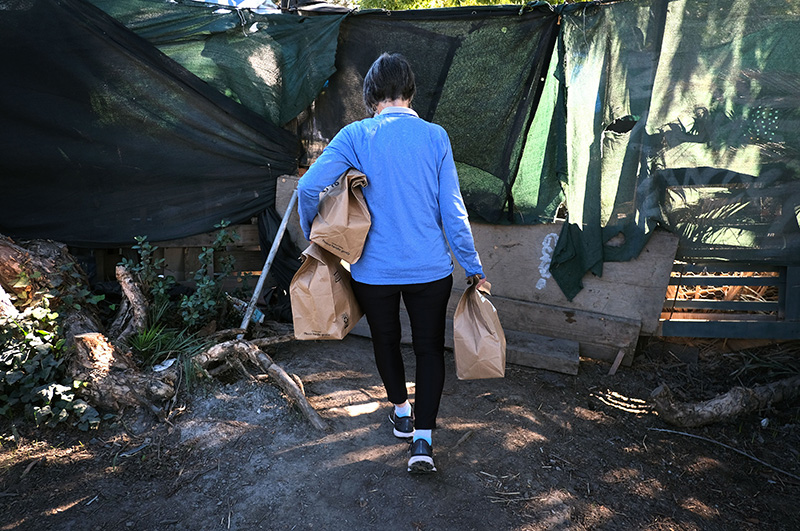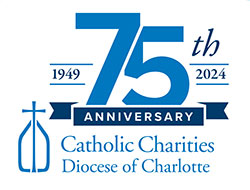 A volunteer brings several bags of food and clothing to a homeless camp in Redwood City, California, in this 2021 Catholic News Service file photo. Every human being has rights – including the right to shelter, food, clothing and other basic necessities. One of the responsibilities Catholics have is to exercise their rights in order to promote the common good. ( CNS | David Maung)Editor's note: Catholic Charities Diocese of Charlotte is highlighting the seven themes of Catholic Social Teaching for its year-long 75th anniversary celebration. This week, the focus is on “Rights and Responsibilities.” The Church teaches that every person has a fundamental right to life and a right to those things required for human decency. Along with these rights come responsibilities – to one another, to our families, and to society.
A volunteer brings several bags of food and clothing to a homeless camp in Redwood City, California, in this 2021 Catholic News Service file photo. Every human being has rights – including the right to shelter, food, clothing and other basic necessities. One of the responsibilities Catholics have is to exercise their rights in order to promote the common good. ( CNS | David Maung)Editor's note: Catholic Charities Diocese of Charlotte is highlighting the seven themes of Catholic Social Teaching for its year-long 75th anniversary celebration. This week, the focus is on “Rights and Responsibilities.” The Church teaches that every person has a fundamental right to life and a right to those things required for human decency. Along with these rights come responsibilities – to one another, to our families, and to society.
Catholic Social Teaching provides a guiding light for ethical and moral living. It emphasizes the worth of every person and provides a framework for our rights and our responsibilities as Catholics and as citizens.
Responsible Citizenship
Responsible citizenship is more than just about voting or “doing our civic duty” – it’s a moral imperative. It empowers people to shape their communities by participating in politics and civic affairs. Beyond voting or following laws, it calls for actions that promote justice, peace and the welfare of all.
Central to responsible citizenship is the recognition of human dignity. Because they are created in God’s image, everyone deserves respect and protection of their rights. This principle challenges Catholics to go beyond self-interest. Instead, it is a responsibility for creating the conditions for each person to flourish.
“We must recognize that we are part of one human family and are responsible for each other’s well-being,” says Joseph Purello, director of Catholic Charities’ social concerns and advocacy programs.
Basic Human Rights
Catholic Social Teaching emphasizes this interplay between rights and responsibilities. First, every person has rights – including the right to life, food, shelter, healthcare, education and employment.
St. John XXIII spelled out these basic human rights in his 1963 encyclical “Pacem in Terris” (“Peace on Earth”): “Man has the right to live. He has the right to bodily integrity and to the means necessary for the proper development of life, particularly food, clothing, shelter, medical care, rest, and, finally, the necessary social services. In consequence, he has the right to be looked after in the event of ill health; disability stemming from his work; widowhood; old age; enforced unemployment; or whenever through no fault of his own he is deprived of the means of livelihood” (11).
Everyone's Responsibilities
Second, safeguarding these rights is everyone’s responsibility and is crucial for human dignity to flourish.
As St. John XXIII went on to explain in “Pacem in Terris”: “To claim one’s rights and ignore one’s duties, or only half fulfill them, is like building a house with one hand and tearing it down with the other” (30).
That means Catholics are called to live out their faith in concrete ways that respect others’ rights, uplift at-risk communities, advocate for justice, and help the poor and vulnerable in whatever ways they can.
It also means Catholics are urged to participate in political life and to pray for our political leaders.
As Pope Francis has said, “We need to participate for the common good. Sometimes we hear: A good Catholic is not interested in politics. This is not true: Good Catholics immerse themselves in politics by offering the best of themselves so that the leader can govern.”
Being politically engaged does not mean being partisan, however.
Pope Francis also notes, “All political activity must serve and promote the good of the human person and be based on respect for his or her dignity.”
The Church does not serve the interests of a particular party or interest group. Above all, the Church calls all people of good will to see the inherent value of human life because we are all made in the image of God.
With that as a Catholic’s fundamental moral principle, they naturally will want to work to protect and nurture human life. That means defending the right to life for every human being – no matter what – as well as working to meet the needs of those who are marginalized or vulnerable, and giving voice to those who lack a strong voice to protect their own rights and well-being.
As St. John Paul II wrote in “Christifideles Laici” (“On the Vocation and Mission of the Lay Faithful”), “The inviolability of the person, which is a reflection of the absolute inviolability of God, finds its primary and fundamental expression in the inviolability of human life. Above all, the common outcry, which is justly made on behalf of human rights – for example, the right to health, to home, to work, to family, to culture – is false and illusory if the right to life, the most basic and fundamental right and the condition for all other personal rights, is not defended with maximum determination.”
It can be difficult to discern how to exercise one’s responsibilities in civic life, particularly given today’s fractious culture.
Catholics must strive to continually better understand their faith – for example, by reading Scripture and the Catechism of the Catholic Church – and by talking with their pastor and other educated Catholic leaders. Above all, prayer is important – for example, by asking the Holy Spirit for wisdom to help cultivate the virtue of prudence.
Also guiding Catholics in how and why to participate in public life is the U.S. bishops’ document “Forming Consciences for Faithful Citizenship.” It represents their guidance for Catholics in how to exercise their rights and duties as participants in our democracy.
“By living as faithful citizens we bring the love of God to our complex society,” Purello explains. “And we witness to our commitment to a solidarity that seeks no one in the human family to be marginalized, neglected, harmed or, at worst, denied the right to life.”
— David Long, Special to the Catholic News Herald. Material provided by the U.S. Conference of Catholic Bishops’ website, www.usccb.org
 More online
More online
At www.ccdoc.org/citizenship: Find a link to the USCCB’s “Forming Consciences for Faithful Citizenship,” plus other resources and information on this topic.



 More online
More online